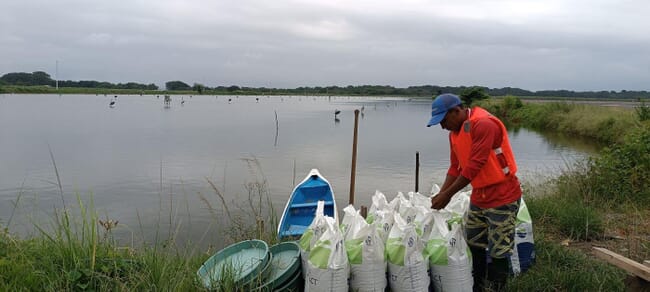
© BioMar
Regarding the newly formed partnership, Olivier Vandebeulque, Auchan seafood manager stated in a press release: “Our customers are asking for more responsible seafood. To ensure we can provide it, we need commitment from the entire value chain. This is the whole purpose of our collaboration with Earthworm Foundation”
Shrinking the shrimp carbon footprint
Henrik Aarestrup, vice president at BioMar, added: “During the project, we utilised our sustainability impact assessment tool (BioSustain LCA) to minimise the carbon footprint of the shrimp feed through meticulous recipe optimisation. We replaced fish oil with microalgae and sourced 100 percent of the marine protein from high-quality trimmings.”
In a first for BioMar, the project also saw the company's sustainability consultants introduce recommendations to shrimp producer Edpacif on how to reduce the carbon footprint of the farming process.
As a response, Auchan is testing a new way to commercialise shrimp products.
Vandebeulque explains: “We decided to also sell trays with only the shrimp tails. This innovation has two benefits: the carbon footprint associated with product transport is reduced by 40 percent; and the shrimp heads are processed and reused locally in Ecuador for animal feed, further increasing circularity in the production.”
“Equally important is the fact that none of the ingredients used in the shrimp feed come from deforested or even tropical areas” added Aarestrup. “Shrimp feeds can contain up to 50 percent soy, so responsible sourcing of this key ingredient is crucial to achieving good environmental outcomes.”
Beyond the farm
“A responsible shrimp also needs to take into account social sustainability,” explained Florie Loth, ocean programme manager at Earthworm. “In Ecuador, our shrimp-related activities focus on capacity-building initiatives to drive social change. While the project helped enhance access to stable employment for the local community, Earthworm teams also worked with Edpacif to improve working conditions and provide better housing for workers.”
The new product line will be granted the Mr Goodfish label. Launched in March 2010 in France by Nausicaá, National Sea Center, the Mr Goodfish programme aims to raise awareness of responsible seafood consumption. The programme covers three pillars: responsible feed, optimal farming conditions for animal welfare, and environmental impact.
As part of the project, Mr Goodfish and Earthworm worked in partnership to add a social pillar to the specifications for the Ecuadorian shrimp.
“We believe the project is raising the bar for shrimp products,” said Loth. “Our hope is that it will inspire others to adopt more sustainable practices – practices that help preserve biodiversity and protect human rights.”
The new product line is now available in French Auchan supermarkets.




